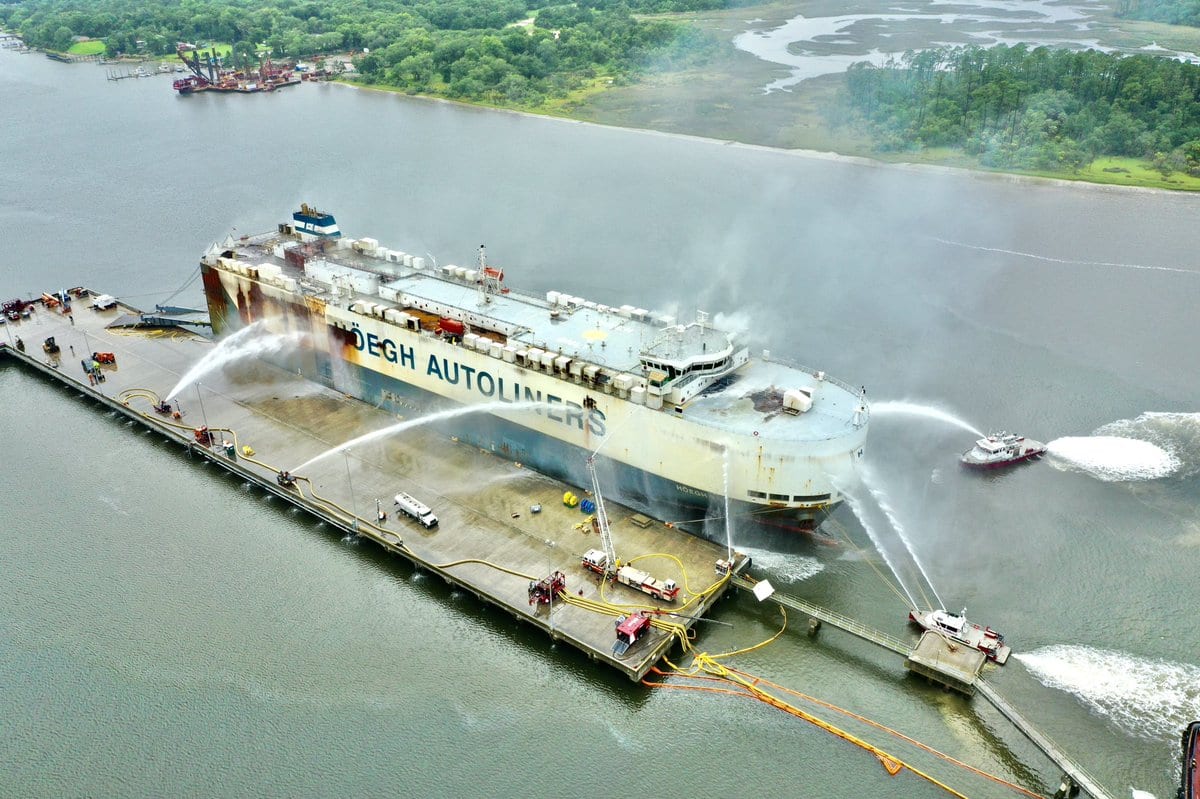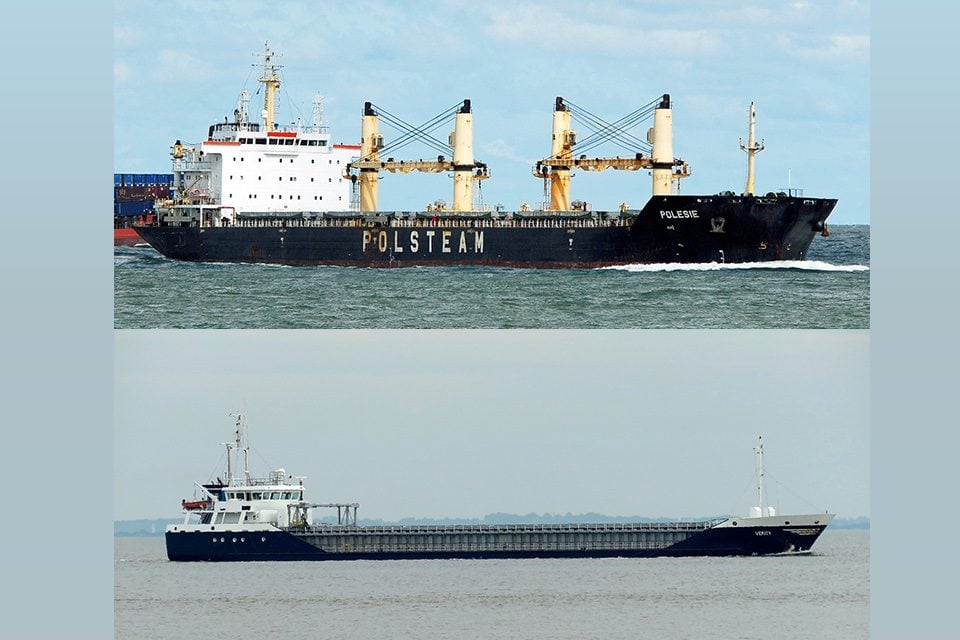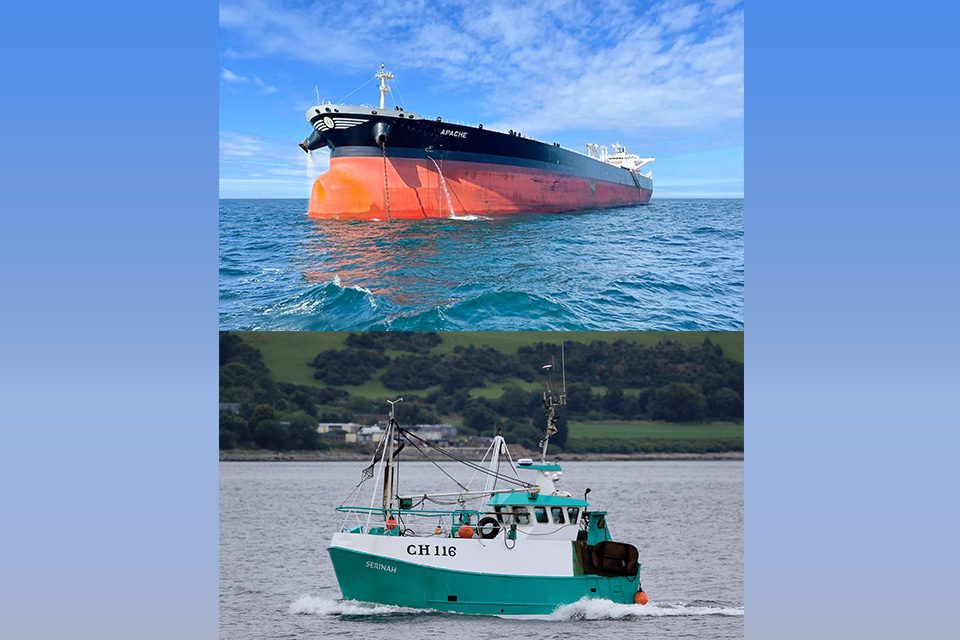The National Transportation Safety Board has issued eight safety recommendations stemming from its investigation into the June 2020 car carrier fire in Jacksonville, Florida.
The NTSB has come out with its investigation report into last year’s fire aboard the Höegh Xiamen, revealing an improperly disconnected battery in a used vehicle led to the fire.
The vehicle/car carrier caught fire on June 4, 2020, while in Jacksonville, Florida, resulting in the total loss of the vessel and its cargo of 2,420 used vehicles. The fire burned for over a week and injured nine firefighters. None of the ship’s 21 crewmembers were injured. Total damages are estimated at $40 million.
In August 2020, after salvage operations were completed, the vessel was towed to Turkey to be recycled.
The NTSB has now issued eight safety recommendations to federal regulators and the companies involved in the accident.
The NTSB’s investigation was detailed in Marine Accident Report 21/04, published Thursday. According to the report, Höegh Xiamen’s crew noticed smoke coming from the ventilation housing while preparing to depart port for Baltimore, Maryland. Crew members discovered a fire on deck 8, which had been loaded with used vehicles. The fire eventually spread to other decks and continued to burn for eight days.
The NTSB concluded that many of the vehicles loaded onto the vessel had batteries that were not disconnected and secured in accordance with procedures, which increased the risk of electrical arcing and component faults. During loading operations, both the loading personnel and crew missed opportunities to address these hazards, the NTSB said.
The investigation also showed that the detection of the fire was delayed because the vessels’ fire detection systems had not yet been reactivated after loading was completed. Additionally, the Jacksonville Fire and Rescue Department’s response to the accident was delayed because the Höegh Xiamen’s master did not immediately have available contact information for search and rescue authorities and did not know how to report a fire to local authorities.
The NTSB determined the probable cause of the fire to be Grimaldi Deep Sea’s (who time chartered the vessel) and SSA Atlantic’s (Grimaldi’s contractor for stevedores) ineffective oversight of longshoremen, which did not identify that Grimaldi’s vehicle battery securement procedures were not being followed. “This resulted in an electrical fault from an improperly disconnected battery in a used vehicle on cargo deck 8. Contributing to the delay in the detection of the fire was the crew not immediately reactivating the vessel’s fire detection system after the completion of loading. Contributing to the extent of the fire was the master’s decision to delay the release of the carbon dioxide fixed fire?extinguishing system,” the NTSB’s report said.
Safety issues identified in the report include:
- training for and oversight of vehicle battery securement,
- regulatory exceptions for used and damaged flammable?liquid-powered vehicles,
- fire detection system deactivation during cargo loading, and
- effective emergency distress calls.
NTSB issued one recommendation each to the Pipeline and Hazardous Materials Safety Administration, U.S. Coast Guard, and the National Maritime Safety Association; two recommendations to Grimaldi Deep Sea; and three recommendations to Höegh Technical Management. NTSB’s recommendations to the companies involved improving oversight of vehicle loading as well as training of personnel involved in battery securement for used and damaged vehicles. NTSB’s recommendations to federal agencies involved improving regulations for vehicle carriers that transport used vehicles. NTSB’s recommendations to the vessel’s operator involved revising their procedures for the reactivation of fire detection systems and ensuring emergency contact information is immediately available for bridge teams.
“The transportation of used vehicles, such as those that were loaded on vessels like the Höegh Xiamen, is currently excepted from Hazardous Materials Regulations when a vessel has a stowage area specifically designed and approved for carrying vehicles,” NTSB said in the report. “We found that used vehicles are often damaged and present an elevated risk of fire. We believe that greater inspection, oversight, and enforcement are needed to reduce this risk.”
According to the NTSB, there have been five similar accidents since 2015, including a 2019 fire aboard Grimaldi’s Grande Europa. Following Grimaldi’s experience with previous roll-on/roll-off vessel fires, the company developed a battery disconnect procedure to reduce the risk of vehicle fires during transportation. This procedure was used on Höegh Xiamen; however, the Coast Guard’s postaccident examination of a sample of 59 vehicles did not find a single battery that was secured in accordance with Grimaldi’s battery disconnect procedure.
“The circumstances of this accident make clear that it is critical to ensure that the batteries of used vehicles are disconnected and properly secured during cargo loading operations,” the report said. “The NTSB believes it is imperative that operators of similar roll-on/roll-off vessels engaged in the transportation of used vehicles act to ensure that any personnel involved in loading operations—including vessel crews, stevedores, and longshoremen—be aware of the importance of disconnecting batteries on used vehicles.”
The public docket for the investigation contains more than 750 pages of factual information, including interview transcripts, photographs and other investigative materials.
Editorial Standards · Corrections · About gCaptain

 Join The Club
Join The Club











